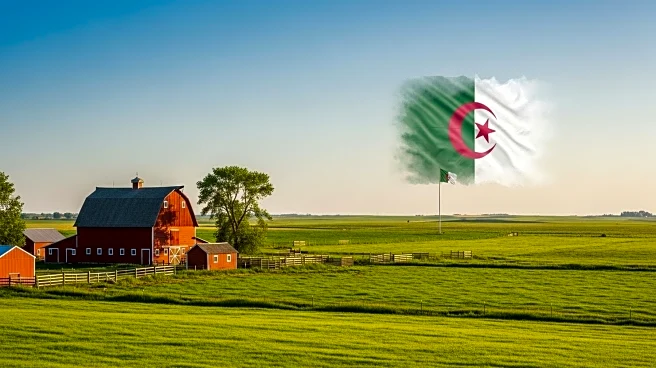What's Happening?
The Algerian government has partnered with a German company to construct the world's largest integrated dairy and powdered milk production facility, a $3.5 billion project. This development is part of Algeria's efforts to enhance its food security by increasing domestic food production. Despite the scale of this project, Norm Dinis of Empire Dairy in Wiggins, Colorado, suggests that dairy producers in the western United States are unlikely to experience significant changes in export dynamics. This is largely due to the current surplus of milk powder on the market, which has reduced its popularity compared to whole milk and protein products. Colorado's dairy industry, which produces approximately 6 million pounds of milk primarily for cheese production, is expected to remain stable.
Why It's Important?
The establishment of a large-scale dairy facility in Algeria highlights the global trend of countries investing in agriculture to ensure food security. For the U.S. dairy industry, particularly in Colorado, this development underscores the importance of adapting to changing consumer preferences, such as the increasing demand for protein-rich products. While the Algerian facility may not directly affect U.S. exports, it reflects a broader shift towards self-sufficiency in food production among resource-rich nations. This could influence global dairy markets and competition in the long term. Additionally, the focus on protein products in the U.S. market presents opportunities for growth and innovation within the domestic dairy sector.
What's Next?
As Algeria progresses with its dairy facility, U.S. dairy producers may need to monitor global market trends and consumer preferences closely. The potential for increased competition in international markets could prompt U.S. producers to explore new product lines or enhance existing offerings to maintain their competitive edge. Additionally, the ongoing labor shortages in the agriculture sector may drive further innovation in automation and efficiency improvements within U.S. dairy operations.
Beyond the Headlines
The Algerian dairy project also raises questions about the sustainability and environmental impact of large-scale agricultural developments. As countries like Algeria invest in agriculture to boost food security, there may be increased scrutiny on the environmental practices and resource management strategies employed by such facilities. This could lead to a broader discussion on sustainable agriculture practices and their role in global food security.










